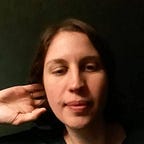Being a scientist-mum: a report for UN Women and Girls in Science Day
A year ago today I was standing at the University of Manitoba bus stop in -10°C with my colleague Robbie Mallett. We had just finished an experiment on artificial sea ice at SERF — an outdoor ice tank. I’d returned to science a few months before after a long career break during which I had a family, and I was revelling in being part of this intensive experimental work and the non-stop scientific discussion that came with it. My husband, who supports me endlessly and is the most hands-on and caring dad anyone could hope for as well as working full time, was taking care of our children. I felt I had it all — I was a mum working as a scientist. I’d just read about the UN’s Women and Girls in Science Day and I was telling Robbie I’d like to write about my experience in future.
Many women working around me have since asked what it’s like and how it works, often trying to weigh up whether they think they can have a family themselves whilst working in academia, so I wanted to write down some of these thoughts for today. Some might say I’ve done it all wrong — general advice is to get a fellowship, then start a family. I’ve felt a bit like a strange phenomenon — an unusual case study (which is fine with me — I’m very proud of these two facets of my identity and happy to discuss them.)
When my children were four, I started my first postdoc job at UCL in a fantastic team led by Prof Julienne Stroeve with the flexibility to work part-time which was key for me. There are many challenges. Academic work requires huge energy and determination, a commitment to trying as hard as you can in the knowledge that you may never get a permanent job and (usually) periods away from home for conferences and fieldwork. It is detailed, innovative, difficult work and aspects of family life like being woken up at unusual times (sometimes lots of them) can make having a clear head and boundless energy quite challenging. A lot of people hold up the flexibility of academic work as an advantage when having children. I’m on the fence — yes, but it also means you have the flexibility to work a lot of hours, it’s fun so it gets late… and then you realise that the kids will be waking up soon…
Looking at it the other way round offers the real insight. It took me a while to realise that, broadly, when I’m happy my children are happy. When I’m proud of myself, they are too. The more fulfilled I am, the more love I have to give them. Sources of fulfilment are different for everyone. Earth’s environment is endlessly fascinating to me and I imagine I’ll be working on the myriad aspects (especially climate, physics of remote sensing and human impacts and responses) for the rest of my life. But there is a very delicate balance to tread. It’s easy to get lost in work, pursuing avenues of coding marvels and revelations in datasets. Too much of these good things brings exhaustion and frustration which permeate family life. A disappointment has been to learn I’m considered ineligible for many fellowships because I took a career break to have a family, despite having so little postdoctoral experience, because I finished my PhD too long ago. If other, better scientists get the funding that’s fair enough, but I’d like to have the chance to compete. I’m contacting those organisations, enquiring about their eligibility criteria, highlighting what appears to me to be unintended discrimination towards people who have taken a career break, for example to have a family (often women). Many other fellowship-offering organisations are working hard to accommodate applicants with caring responsibilities. I hope that through one of those routes and with the support of the incredible people around me at work and at home I may be able to make it to the next level.
Much more alarming has been to realise the limited diversity in environment-related professions, with under-representations relating to race, gender, sexual orientation, disability and so on. At a time when these fields are looked to for solutions to some of the world’s biggest problems, we cannot afford to restrict the sources of insights and innovations to a narrow pool of people. As I tread my delicate balance, constantly re-evaluating how to use my time and energy (especially with the school and nursery closures that the pandemic has brought) sometimes I feel elated, sometimes inadequate. I always feel frustrated at the inequality and discrimination which are systemic across environment-related professions and which I (as a privileged white woman) feel personally in an extremely limited way. This situation is something I hope I can have a positive impact on, however small, by educating myself, questioning systems and trying to help put in place processes that correct for centuries of imbalance. I sometimes feel the odds are stacked against me but they are stacked far more heavily against others.
Watching my children learn has taught me to make mistakes, ask questions and examine endlessly with openness and honesty. I can tell them that I’m doing what I love and not holding back for fear of not being good enough — as I teach them to do. My daughter recently told me she wanted to be a scientist. When I asked her what kind, she said “Your kind.” Whatever kind I am, I hope I can give myself and others the chance to develop ourselves, explore and discover unknown aspects of the world we live in and perhaps contribute to solutions to some of the biggest challenges we face today.
In memory of Seymour Laxon and Katharine Giles, who started me on this journey but are no longer with us.
